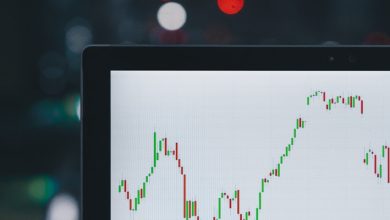The Effect of Geopolitical Events on Crypto Prices

- Understanding the correlation between geopolitical events and cryptocurrency prices
- How political tensions impact the volatility of the crypto market
- Analyzing the role of global conflicts in shaping the value of digital currencies
- The influence of government regulations on the price fluctuations of cryptocurrencies
- Exploring the connection between economic sanctions and the crypto market
- Case studies: How specific geopolitical events have affected the prices of popular cryptocurrencies
Understanding the correlation between geopolitical events and cryptocurrency prices
Understanding the relationship between geopolitical events and cryptocurrency prices is crucial for investors and traders in the digital asset market. Geopolitical events such as political instability, economic sanctions, and trade wars can have a significant impact on the value of cryptocurrencies. These events can create uncertainty in the market, leading to fluctuations in prices as investors react to the changing landscape.
One of the key factors that influence cryptocurrency prices in response to geopolitical events is market sentiment. When there is geopolitical tension, investors may flock to safe-haven assets such as Bitcoin or Ethereum, driving up their prices. On the other hand, negative news or events can lead to a sell-off, causing prices to drop. It is essential for market participants to stay informed about global developments and how they may affect the cryptocurrency market.
Moreover, regulatory changes in response to geopolitical events can also impact cryptocurrency prices. For example, government crackdowns on digital assets in certain countries can lead to a decrease in trading volume and liquidity, resulting in price declines. Conversely, positive regulatory developments can boost investor confidence and drive prices higher.
Overall, the correlation between geopolitical events and cryptocurrency prices is complex and multifaceted. By staying informed, monitoring market sentiment, and understanding regulatory changes, investors can better navigate the volatile nature of the cryptocurrency market and make informed decisions to mitigate risks and capitalize on opportunities.
How political tensions impact the volatility of the crypto market
Political tensions have a significant impact on the volatility of the cryptocurrency market. When there is uncertainty or instability in the political landscape, investors tend to flock to alternative assets like cryptocurrencies as a way to hedge against traditional markets. This increased demand can drive up prices, leading to greater volatility in the crypto market.
Geopolitical events such as trade wars, sanctions, or political unrest can create a sense of fear and panic among investors, causing them to seek out safe-haven assets like Bitcoin or Ethereum. As a result, the prices of these cryptocurrencies can experience sharp fluctuations in response to political developments.
Moreover, government regulations and policies related to cryptocurrencies can also be influenced by political tensions. For example, a government crackdown on crypto exchanges or a ban on digital assets can lead to a sell-off in the market, further exacerbating volatility.
Overall, it is essential for investors to stay informed about geopolitical events and their potential impact on the crypto market. By understanding how political tensions can affect prices, investors can make more informed decisions and better navigate the volatile nature of the cryptocurrency market.
Analyzing the role of global conflicts in shaping the value of digital currencies
Global conflicts have a significant impact on the value of digital currencies. When geopolitical events unfold, investors often turn to cryptocurrencies as a safe haven asset, driving up demand and subsequently prices. The uncertainty and instability caused by conflicts can lead to a flight to safety, with many seeing digital currencies as a way to protect their assets from traditional market volatility.
Furthermore, global conflicts can also affect the supply and demand dynamics of digital currencies. For example, sanctions imposed on a country involved in a conflict can restrict access to traditional banking systems, leading to an increased interest in cryptocurrencies as an alternative means of transacting. This surge in demand can drive up prices as more people seek to acquire digital assets.
Moreover, the role of global conflicts in shaping the value of digital currencies extends beyond mere financial considerations. In regions experiencing conflict, the local currency may lose value rapidly, prompting residents to seek out more stable alternatives such as Bitcoin or Ethereum. This shift towards digital currencies can further drive up their value as adoption increases in conflict-affected areas.
The influence of government regulations on the price fluctuations of cryptocurrencies
The influence of government regulations on the price fluctuations of cryptocurrencies is a significant factor to consider when analyzing the impact of geopolitical events on crypto prices. Government regulations can have a direct impact on the value of cryptocurrencies by affecting their legality, accessibility, and overall market sentiment. When governments impose strict regulations on the use of cryptocurrencies, it can lead to a decrease in demand and a subsequent drop in prices. On the other hand, favorable regulations can boost investor confidence and drive up prices.
Government actions such as bans on cryptocurrency exchanges, restrictions on initial coin offerings (ICOs), and crackdowns on illegal activities involving cryptocurrencies can all contribute to price volatility. Additionally, government statements regarding the future of cryptocurrencies can also influence market behavior. For example, announcements of potential regulations or bans can cause panic selling, leading to sharp price declines.
It is essential for investors to stay informed about government regulations and their potential impact on the cryptocurrency market. By monitoring regulatory developments and understanding how they can affect prices, investors can make more informed decisions about buying, selling, or holding cryptocurrencies. Ultimately, government regulations play a crucial role in shaping the price fluctuations of cryptocurrencies in response to geopolitical events.
Exploring the connection between economic sanctions and the crypto market
One interesting aspect to consider when analyzing the impact of geopolitical events on the crypto market is the connection between economic sanctions and cryptocurrency prices. Economic sanctions imposed by governments can have a significant effect on traditional financial markets, leading investors to seek alternative assets such as cryptocurrencies. This shift in investment behavior can result in increased demand for cryptocurrencies, driving up their prices.
Furthermore, economic sanctions can also influence the value of fiat currencies, leading individuals in sanctioned countries to turn to cryptocurrencies as a more stable store of value. This increased adoption of cryptocurrencies in regions facing economic sanctions can further contribute to their price appreciation.
It is essential for investors and analysts to monitor geopolitical events and economic sanctions closely, as they can provide valuable insights into potential price movements in the crypto market. By understanding the relationship between economic sanctions and cryptocurrency prices, market participants can make more informed decisions and capitalize on emerging opportunities.
Case studies: How specific geopolitical events have affected the prices of popular cryptocurrencies
Exploring case studies can provide valuable insights into how specific geopolitical events have impacted the prices of popular cryptocurrencies. By analyzing these instances, we can better understand the relationship between global political developments and the crypto market.
- **One** such case study involves the **Brexit** referendum in **2016**. The uncertainty surrounding the UK’s decision to leave the European Union caused **Bitcoin** prices to **fluctuate** significantly. Investors turned to **cryptocurrencies** as a **safe haven** asset, driving up demand and prices.
- **Another** example is the **US-China trade war** that began in **2018**. As tensions between the two economic **powerhouses** escalated, **cryptocurrency** prices experienced **volatility**. Traders sought refuge in **digital assets** amid fears of a global economic slowdown.
- **The** recent conflict between **Russia** and **Ukraine** has also had an impact on **crypto** prices. **Geopolitical** tensions in the region led to **uncertainty** in traditional markets, prompting investors to diversify their portfolios with **cryptocurrencies**.
These case studies demonstrate the interconnected nature of **geopolitics** and **cryptocurrency** markets. By monitoring global events and their effects on **digital assets**, investors can make more informed decisions and navigate **market** fluctuations with greater **confidence**.



